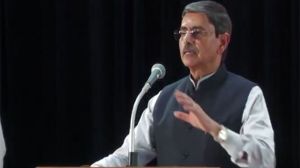SACHanINnings!
He's always reserved in public, rarely demonstrative, reluctant to display emotion. But not this time. No, this time Sachin Tendulkar smashe...

He8217;s always reserved in public, rarely demonstrative, reluctant to display emotion. But not this time. No, this time Sachin Tendulkar smashes a hole in the air with his fist after his century. And after it8217;s all done, he can8217;t get rid of his smile. It8217;s there in the dressing room, out on the ground as the fans bellow, during his television interview. He says he8217;s 8216;8216;very relieved8217;8217; but it didn8217;t need asking. See that smile, it tells it all.
His Sydney Saturday game wasn8217;t merely an outrageous innings, it was a reminder, just in case we8217;d forgotten, what a champion he is, how deep his desire flows, how bruised his ego was. He could have scored 90, or even a 101, and the world would have resumed spinning, it would have been safe to exhale.
But no, he produces the biggest score of his life 220 not out, bats from ball one to last, writes a thesis on discipline, takes though scarcely alone the series out of Australia8217;s grasp.
He says he hasn8217;t read a newspaper, not a word about the shrill debate on footwork, technique, confidence; he says he won8217;t be reading one today either. What for? He8217;s written the headline himself and this is what it reads: 8216;8216;Did someone say slump?8217;8217;
Of course, there was a match on here, India is at 5-650, VVS Laxman sculpted a 178 of clearly superior shot-making in a partnership of 353, but at the press conference he sat stoically, almost invisible, as questions were rapidly hurled at Tendulkar.
Years ago, after another improbable Ian Botham moment, Graham Gooch asked him, in disbelief: 8216;8216;Who writes your script?8217;8217; Perhaps Laxman was tempted to ask Tendulkar the same, but some genius is beyond explanation.
Short of hotel rooms being bugged, every word and move of Tendulkar8217;s has been vigilantly recorded. But there is no proof of anxiety, of sweaty palms, of visits to a hypnotist. As Tendulkar said: 8216;8216;It8217;s not that I wasn8217;t batting well. Instead of getting beaten, I was nicking it the ball. But I knew a big innings was around the corner.8217;8217;
Sports psychologist Sandy Gordon, like he did with the team, did have a 8216;8216;very brief chat8217;8217; with Tendulkar. Gordon refused to elaborate, but did say this today: 8216;8216;He8217;s one of the most mentally tough athletes, and most modest athletes, I8217;ve ever worked with. I wouldn8217;t say he wasn8217;t nervous or apprehensive, but that8217;s not a bad thing. He knows his game and he knows what works for him, and he made it work today.8217;8217; Ajit Agarkar later said: 8216;8216;The only thing he did was work that much harder.8217;8217; Then, he added of his friend: 8216;8216;Greatness is a word which goes with him.8217;8217; It is an appropriate line. Extraordinary athletes, whether Michael Jordan or Pete Sampras, even when not at the peak of their powers, find a route to success, they adapt, invent, compensate for one fading or briefly lost skill with another.
Tendulkar8217;s innings epitomises that. He was not the batsman of contemptuous dominance we are familiar with, not the gladiator who shreds attacks with his blade. Perhaps that batsman has passed on, or on temporary leave, but yesterday was unveiled a warrior of different, but as admirable, virtues. He is a man of more skills than we know.
The scoreboard did not leap wildly, it rolled quietly, as he built a century of pure application, of deliberate and cautious construction over 574 minutes. For most of his first hundred, scarcely a shot stayed in the memory, for this was more an accumulation than a decimation.
Ball after ball after ball outside off stump was disdained, for the pursuit of them has recently been fatal for him. But what immaculate restraint, what desperate obedience to plan it must have taken, for a player of such aggression to play in such a contrary way. It was the most compelling advertisement of will he has ever provided. As he said later, barring the odd error of judgment, 8216;8216;throughout I maintained discipline.8217;8217; Tendulkar, for himself, and his team, had found a way.
But some of his innings, and much of India8217;s dominant situation, would not have been possible without Laxman, who commenced the day like an aristocrat who believed singles are a plebian pursuit: his first five scoring shots were 4, 4, 4, 4, 4. Of course, he was not perfect; once he even hit a ball to a fielder. But his initiative eased the pressure off Tendulkar, allowing him to bat to his own watchful drummer.
Laxman is a wonderfully well-mannered fellow, and it follows that his batting is all grace and decorum, absent of rude strokes or offensive shots. There is no bludgeoning violence to his game; instead as it was once said of another artist, John McEnroe, 8216;8216;it8217;s a slice here, nick there, cut over here. Pretty soon you8217;ve got blood all over you although the wounds aren8217;t deep. Soon after that you8217;ve bled to death.8217;8217;
But beyond the prettiness, there is a cussedness to Laxman not adequately celebrated. It is evident in the way he has remade his career, in his refusal to open even if it meant non-selection for it did not work for him. Oh, and one more thing: you don8217;t become the only batsman to be involved in three 300-run partnerships without some steel behind that charm.
India will bat on, perhaps till 700, heaping a pressure on Australia they are unfamiliar with. With the follow-on target possibly 500, India has earned itself a formidable opportunity. Whatever happens though, one thing is almost certain: the Border-Gavaskar trophy is staying home.
- 01
- 02
- 03
- 04
- 05































